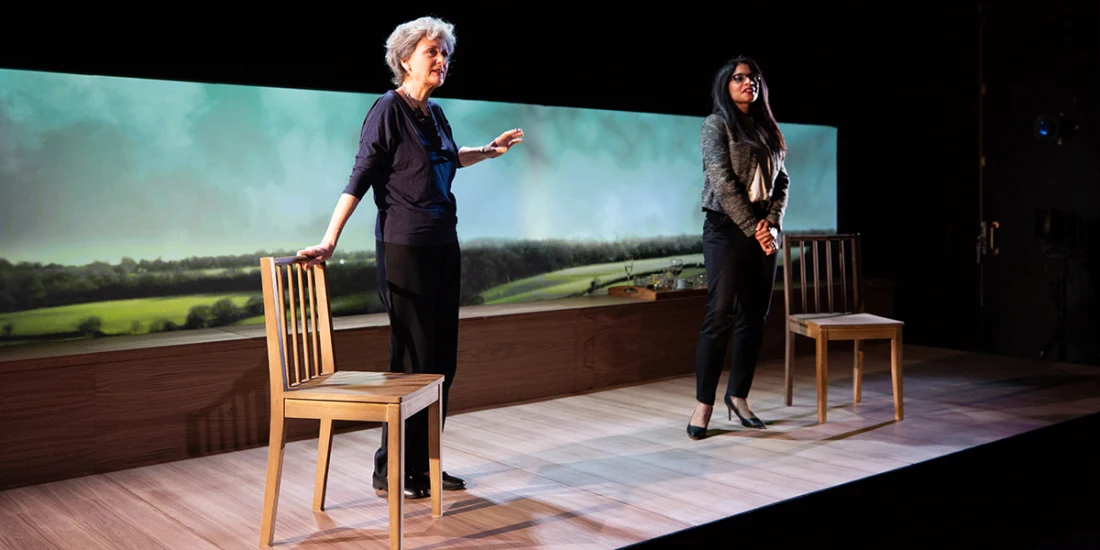'Bloody Difficult Women' review — Brexit politics take centre stage
'Bloody Difficult Women' is at Riverside Studios.
Add Tim Walker to those London critics (Nicholas de Jongh, Lloyd Evans, and Sheridan Morley are just a few of the others over the years) to swell the ranks of poacher-turned-gamekeeper. By that, I am referencing Walker’s about-face here as a playwright when he is better known as a longtime journalist and critic, at the moment for The New European. His play, Bloody Difficult Women, takes the approach taken some years ago by Schiller’s masterpiece Mary Stuart in opposing two real-life female public figures who are seen first in their separate environments and then brought together for a final scene that, in Walker’s play as with Schiller’s, is the best of the evening.
Even if Walker isn’t the authorial equivalent of his venerated German forbear (not many are!), he has nonetheless surrounded himself with some august collaborators who make his neophyte playwriting effort sing. Indeed, amongst the various accomplishments of the evening is that it refuses to make villains of any of the people involved, this despite a tabloid culture — given prominence in the play — that is inclined toward precisely that.
While the play takes its title from Tory grandee Kenneth Clarke’s onetime description of the then-prime minister, Theresa May, as a “bloody difficult woman”, Walker views this country’s second-ever female leader through as rounded a prism as her antagonist, Gina Miller: the Anglo-Guyanese activist who took the Tory government to court over their mishandling of the Brexit process.
Walker lays out both women’s backgrounds in an exposition-heavy start to a production that finds the uniformly fine cast on view throughout against the backdrop of breaking news that gives an immediacy to the director Stephen Unwin’s pacy production. The music could as well be cueing up for the News at 10, and the play, presented without an interval, is over in good time for audiences to be home in front of their tellies at that very hour.
Several times married, Miller is seen subordinating family life to a gathering fury at the government’s disregard for protocol and its craven surrender to the demands of a populist press here embodied by former Daily Mail editor Paul Dacre, who is played by Andrew Woodall with relentless condescension and scorn — and the foul mouth to go with it. The devil here as elsewhere tends to get the best tunes, and you can feel Walker succumbing to the allure of the character you love to hate. This Dacre hurls epithets with a level of scowling abandon that presumably kept the lawyers busy as they made their way through the play’s various drafts.
No less compelling, if considerably more sinuous, is a composite character, Sir Hugh Rosen, whom anyone with even the most cursory awareness of English upper political echelons, or this country’s educated elite in general, will recognise in Graham Seed’s sly, spry performance: the suggestively spoken, closeted homosexual with a penchant for younger men who trains up a new recruit, Max (Calum Finlay), revealed late in the play to be straight; Finlay doubles as a lippy Daily Mail journalist given to variations on Cockney rhyming slang, several examples of which were new to me — Perry Como for “homo” is one I hadn’t heard before.
At times, I was unsure whether the women of the title were going to get a proper look-in, not least given that the depiction of them both early on is pretty much as you’d expect. Amara Karan’s determined, often-barefoot Miller is the dog with a retributive bone possessed of a tragic back story that gets revealed at the 11th hour: here’s someone who declines coffee so she won’t need the loo.
May, for her part, buckles under repeated pressure to tell all about a personal life that she would prefer to keep close to her chest. That choice is seen to exist at the detriment of her appeal to a party that will soon fall instead for the contrastingly reckless, journalistically colourful Boris Johnson. The current prime minister, interestingly, is never once named outright during a play that finds various euphemisms for him instead. Less lucky is May’s predecessor (and the begetter of the Brexit referendum) David Cameron, whose vilification as a “conceited, shallow man” doubtless earns mental standing ovations from a Riverside audience inclined, like Walker and, indeed, Miller, to take the Remain cause. We’re reminded, at the same time, of May’s pro-Remain stance, which complicates the dynamic nicely.
Jessica Turner is superb as May, countering the occasionally on-the-nose writing with a sense of reserve that lies beyond the scope of the play and makes you yearn for the memoir that she of all people must have lying in wait. Karan achieves a poignant give-and-take with her supportive, occasionally anxious husband Alan, a part ably filled at the performance caught by the ever-expert Simon Harrison, here filling in for an indisposed Edmund Kingsley.
At times you have to wonder what, say, James Graham might have made of the same face-off in a far-longer playwriting career that has consisted of imagining precisely such conversations between the great and the good — or at least the widely known. But Walker has penned a neat springboard for some top-rank actors to do their thing, in the process giving us much to ponder about the recent past as we navigate a yet-darker present dominated by one bloody difficult (and dangerous) man.
Photo credit: Bloody Difficult Women (Photo by Mark Senior)
Originally published on
